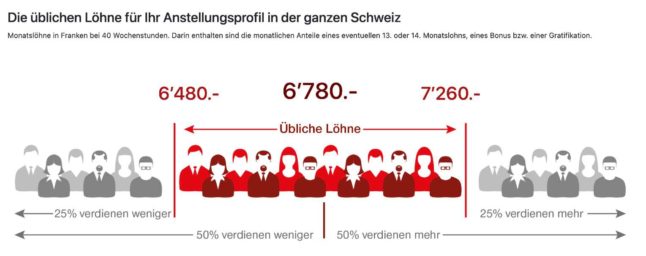Swiss salaries are known to be among the most competitive in the world.
This however does not prevent people from being underpaid.
Swiss salaries: How much do people earn in Switzerland?
A wage calculator created by the Swiss Federation of Trade Unions (SGB) allows employees to check within seconds whether their salaries are high enough.
The SGB programmed the calculator with the latest salary levels from 72 different industry sectors and 36,000 companies.
Ultimately, the tool takes into account the wages of more than two million employees.
In June 2021, the SGB updated the calculator with new information and improved its usability.
The underlying data comes from Switzerland’s Federal Statistical Office.
By inputting information such as the number of years spent working in a given position, the online calculator computes customary local wages for the job in question.
READ MORE: REVEALED: What are the best and worst paid jobs in Switzerland?
The calculator is available at the following link in French, German and Italian.
In addition to knowing how your actually salary compares to the average, the tool is also useful in wage negotiations with your employer.
How does the tool work?
At present, an English version of the wage calculator has not been developed.
That said, it is relatively simple to use even if your French, German or English is in need of improvement.
Firstly, enter your job title. Then enter the type of work you practice, i.e. your specification.
Then you will be asked to enter a range of specific factors about yourself, including your age, your education and experience, where you live and how much you work per week.
The tool will then provide a range in which your salary should sit.
As can be seen in the following image, this will be relatively broad so as to include bonuses or the possibility of being paid a ’13th’ or ’14th salary’.
You are also shown where you sit compared to other workers in similar industries, i.e. how many earn more or less than you.

There are also a relatively comprehensive set of FAQs which explain how wages work in Switzerland, how to calculate your wage (i.e. hourly, daily, weekly or monthly) and various other questions.
It also lays out steps you can follow if your wage is less than 25 percent below the average, including contacting a union to push your case.
Tool provides minimum wage info
The tool also provides indications as to the minimum wage in different industry sectors.
As The Local Switzerland has reported recently, Switzerland does not have a minimum wage at a federal level, although some cantons have put in place a minimum.
That does not however mean that your employer is free to pay you as much – or as little – as he or she wants. Instead, the minimum amount you can be paid will be determined through negotiations with your employer which will may feature a trade union representative.
Whether this be an hourly amount or one which is set for full or part-time hours, setting a minimum standard in specific industries is a common way to ensure workers aren’t underpaid or unpaid.
More information about the minimum wage in Switzerland can be found at the following link.
Minimum wage in Switzerland: What you need to know
Editor note: A version of this story was first published on The Local Switzerland on June 17th, 2021.



 Please whitelist us to continue reading.
Please whitelist us to continue reading.
Member comments